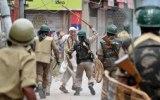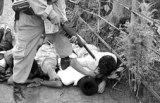Archives
The Armed Forces Special Powers Act
The Armed Forces Special Power Act (AFSPA), bogged down in controversies for last 30 years, is again back in public focus with noted civil right activists to the National Human Rights Commission (NHRC) basically agreeing as legislation is sought to be justified by the Government on the plea that it is required to stop the North East of India and trouble-torn J&K from seceding from the Indian Union. The armed forces call it their vital tool for operations and hence the problems to do away with it.
The efforts to ensure repeal of the Act have gained momentum once Anna Hazare team liberally associated itself with the Irom Sharmila’s agitation in the backyards of Manipur.
 On October 16, Medha Patkar, a key member of team Anna, flagged off an 11-state march from Srinagar to Imphal expressing solidarity with Irom Sharmila, who is on a 10-year-old stir demanding repeal of the draconian Act. One day later, even the National Human Rights Commission (NHRC) Chairman Justice B G Balakrishnan said his panel is ready to consider whether the AFSPA could be repealed or not.
On October 16, Medha Patkar, a key member of team Anna, flagged off an 11-state march from Srinagar to Imphal expressing solidarity with Irom Sharmila, who is on a 10-year-old stir demanding repeal of the draconian Act. One day later, even the National Human Rights Commission (NHRC) Chairman Justice B G Balakrishnan said his panel is ready to consider whether the AFSPA could be repealed or not.
The primary complain against the Act is that under its provisions all security forces operating in trouble - torn areas are given ‘unbridled power’. In effect, the AFSPA goes hand – in - hand with the Disturbed Area Act of 1976.
Under AFSPA provisions, even a non-commissioned officer (rank of havildars) is granted the right to shoot and to kill based on mere suspicion in order to “maintain the public order”.
But the complexity of the demand for repeal of AFSPA is summed up well by a senior intelligence official, who says, “There is a cycle effect involving governance, deployment of armed forces and opportunistic stand taken by politicians on AFSPA.”
|
An Easy Punching Bag Most of the cases of abuse of AFSPA are essentially due to misuse of the provisions of law. The law can be as good or as bad as those who are implementing it. Here is a check list on how, without the AFSPA, some problems would remain: 1. For instance, in 1995 March 5 at Kohima, when the Rastriya Rifles mistook the sound of a tyre burst from their own convoy as a bomb attack and began firing indiscriminately, they did not require AFSPA. They required some self restraint against their actions like launching mortar shells even though by law using mortars in a civilian area is prohibited under army rules. 2. AFSPA and Disturbed Area Act give the Centre some extra power vis-à-vis these insurgency - hit states. The Central Government now has the power to overrule the opinion of a State Government and declare an area disturbed. This happened in Tripura once, when the Centre declared Tripura a disturbed area overruling the opposition from the State Government. 3. In Assam, during Operation Rhino, Rajputana Rifles surrounded Bodhakors village on October 4, 1991 and carried out an extensive house to house search. Women were allegedly sexually harassed and men were taken to interrogation camps. But during the combing operation not a single insurgent was found. Who is to be blamed, the AFSPA or the Rajputana Rifles? 4. When the AFPSA law was enacted first in 1958, the Government’s primary interest in the North East was strategic and the need to protect the region from secession. Thus a law was enacted which empowered the Governor to impose collective fines, prohibit public meetings and detain anybody without a warrant. The AFSPA essentially remains the same tool. |
“The intricacies of the AFSPA in the North East and Kashmir could be understood by only realizing how the locals believe that the Indian army is only an instrument of expansionist designs. Therefore, the AFSPA is only seen as a mechanism to exploit the natives, curtail freedom and commit excesses on them,” the official told Eastern Panorama.
Therefore, it would not be erroneous to say that the demand for scraping of the AFSPA easily musters local people’s sanction.
After all, in 2004 in Manipur the demand had gained momentum in the wake of allegation that one Manorama Devi, though a suspected ultra, was ‘raped’ by central forces. Naturally, the army or para military forces like Assam Rifles are identified with the “outsiders”.
Similar is the case in Jammu and Kashmir. The so called high - handedness of the forces has now compelled even children and women in Kashmir to take to the streets.
In fact, in the mid - nineties, one Manipur Chief Minister had favoured revoking AFSPA but declined permission to withdraw armed forces from 60 odd posts in the state saying, “You cannot do that! What will happen to my law and order situation?”
This is the paradox and also the oft - pointed out double standards of the political class.
Though militancy in Kashmir dates back to the time of the country’s liberation, the law was enforced in J&K only in 1990 in the aftermath of heightened militancy after the Rubiya Sayeed hostage crisis. The AFSPA provisions were enforced by way of notification during the V P Singh regime and when Jagmohan, a known hardliner, was the Governor.
But once the Act was enforced in Kashmir, the local politicians and the State Government had never demanded its abrogation earlier. Instead, the Farooq Abdullah government in 2001 had urged the Centre to extend AFSPA provisions even in the Jammu region.
In 1995, the S C Jamir government in Manipur declared the entire state ‘disturbed’ by enforcing the provisions of the Disturbed Area Act and thus ensuring the application of AFSPA.
No headway:
 The Congress - led UPA wants to play the ‘appease minority’ card as the campaign against AFSPA has been smartly linked to the Muslim vote bank. Thus it’s a political tool today for the self - styled secular ‘brand’ of political parties. Therefore, last year, when an all - party meeting was convened – normally all secular brigade parties demanded the repeal of the AFSPA.
The Congress - led UPA wants to play the ‘appease minority’ card as the campaign against AFSPA has been smartly linked to the Muslim vote bank. Thus it’s a political tool today for the self - styled secular ‘brand’ of political parties. Therefore, last year, when an all - party meeting was convened – normally all secular brigade parties demanded the repeal of the AFSPA.
Even in September, 2011, Chidambaram had said a fresh attempt was being made to build consensus within the government to amend the AFSPA.
By using the phrase ‘within the government’ he largely meant the military brass and also the defence ministry. The defence ministry has strongly conveyed its apprehensions to the Home Ministry that replacing AFSPA or any dilution could hamper its operational capabilities to effectively deal with militancy and insurgency. In fact, top army commanders reiterated their stance even in a meeting with the Prime Minister Dr. Manmohan Singh even as the latter had suggested for repeal of the AFSPA and imposition of a more humane Act.
| In the mid - nineties, one Manipur Chief Minister had favoured revoking AFSPA but declined permission to withdraw armed forces from 60 odd posts in the state saying, “You cannot do that! What will happen to my law and order situation?” |
One military source says the alleged rape and ‘custodial’ death of Manorama Devi in Manipur in 2004 followed by protests led to the rollback of the AFSPA from seven assembly constituencies in Imphal. But by 2008-09 when there was a spurt in killing, arson and kidnapping by ultra groups, the Chief Minister O. Ibobi Singh had warned that the Act may be re-imposed.
“We concede, the Home Ministry is trying to remove the apprehensions of the army brass. But the issues persist. We are against tabling of any amendment bill in the winter session,” the source says.
Reportedly, the defence minister A K Antony has, in a meeting with two of his senior colleagues, Chidambaram and Pranab Mukherjee, opposed any dilution in their powers to act to check insurgency and fight the menace of terror. “These could leave the army severely handicapped to operate in troubled areas like the North East and Jammu and Kashmir,” Antony reportedly told them.
Former defence ministers like Mulayam Singh Yadav and Pranab Mukherjee are said to have appreciated the stance taken by the defence ministry and the top army officials. But the seasoned politician that he is, Pranab Mukherjee is said to have applied “other reasonable arguments” also during both the occasions - in his interaction with Antony and also within the cabinet.
Mukherjee has also suggested that all the stake holders on the issue should take a closer view on issues like whether imposing AFSPA in the North East and in Jammu and Kashmir has improved the situation or proved counter productive at times.

